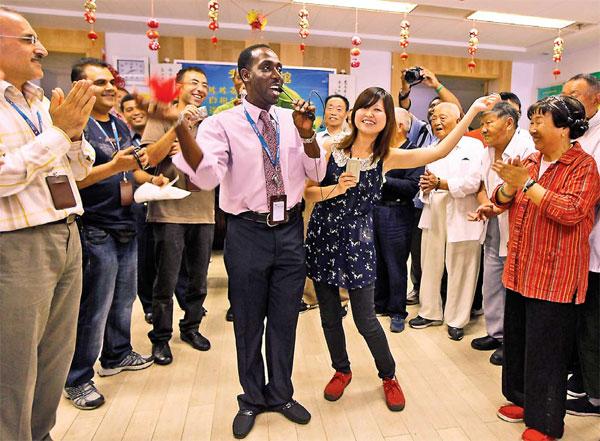A lesson in sharing experiences
Updated: 2012-06-26 04:24
By Tang Yue (China Daily)
|
||||||||
Course focusing on developing countries helps address issues raised by foreign participants and allows them to benefit from the knowledge gained from various projects, Tang Yue reports in Shanghai.
Is there only one party in China?
How are members of the National People's Congress elected?
How will China's family planning policy change?
These were just a few of the questions raised by foreign officials during a lecture entitled State Structure and the Decision-Making System in China, delivered on June 14 at the China Executive Leadership Academy Pudong in Shanghai.
The CELAP lecture was part of a seminar, Infrastructure Planning and Development for Developing Countries, which was attended by 27 participants from 16 countries.
CELAP is no ordinary academy: Founded by the government and supervised by the Organization Department of the Communist Party of China Central Committee, it is one of five national-level institutions to train Party officials.
Apart from training officials in a "global perspective", CELAP has been a leading light in terms of international programs among training institutions for officials.
More than 3,000 officials from 115 countries — about 200 of them at the ministerial level — have attended its courses since the academy opened in 2005.
For officials, the course is required to emphasize the role of Marxism and other political theories.
However, that's not the case for foreigners, said Feng Jun, executive vice-president of the academy.
"There might be a misunderstanding that we are brainwashing foreign officials and asking others to follow our path," he said. "But what we do is to explain our system and share our experiences, not ‘instill' anything. We don't deal with ideology."
In addition to the seminars for developing countries as part of the foreign aid program, and including themes such as city planning, development zones and anti-corruption work, there are also projects that mainly recruit officials from developed countries who are interested in the investment outlook in China.
Despite the different theme of each program, the curriculum always starts with an overall introduction to China, including themes such as a General Review of China, The Relation Between Central and Local Government in China, and China's Agricultural and Rural Development, before expanding on the specific topic of each class.

 Relief reaches isolated village
Relief reaches isolated village
 Rainfall poses new threats to quake-hit region
Rainfall poses new threats to quake-hit region
 Funerals begin for Boston bombing victims
Funerals begin for Boston bombing victims
 Quake takeaway from China's Air Force
Quake takeaway from China's Air Force
 Obama celebrates young inventors at science fair
Obama celebrates young inventors at science fair
 Earth Day marked around the world
Earth Day marked around the world
 Volunteer team helping students find sense of normalcy
Volunteer team helping students find sense of normalcy
 Ethnic groups quick to join rescue efforts
Ethnic groups quick to join rescue efforts
Most Viewed
Editor's Picks

|

|

|

|

|

|
Today's Top News
Health new priority for quake zone
Xi meets US top military officer
Japan's boats driven out of Diaoyu
China mulls online shopping legislation
Bird flu death toll rises to 22
Putin appoints new ambassador to China
Japanese ships blocked from Diaoyu Islands
Inspired by Guan, more Chinese pick up golf
US Weekly

|

|








